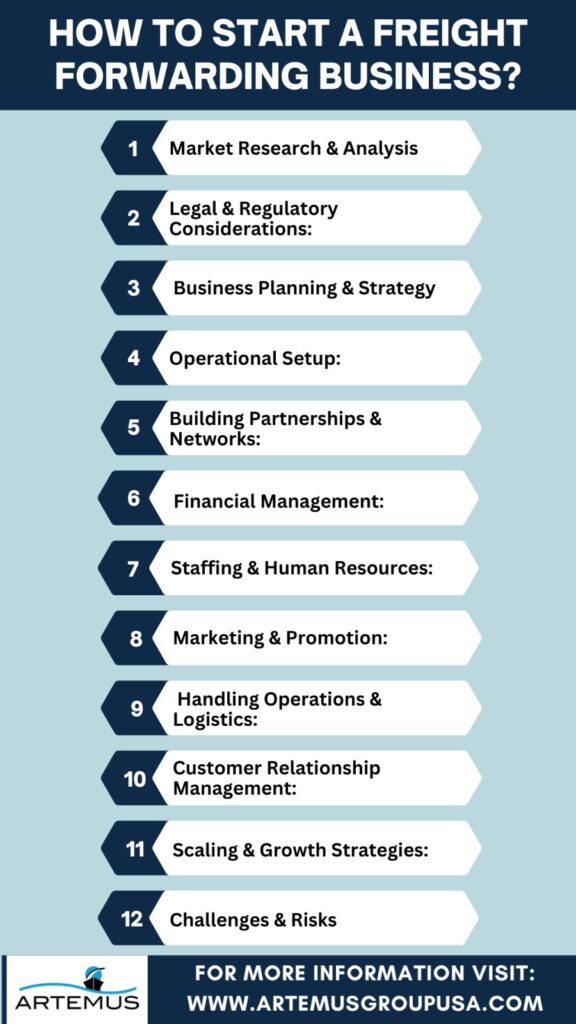
What Is Inbound Logistics & Outbound Logistics? A 2025 Guide
In the dynamic world of supply chain management, understanding the nuances of inbound and outbound logistics is crucial for operational

Embarking on the journey of starting a freight forwarding business is akin to navigating uncharted waters in the realm of international trade and logistics. It requires meticulous planning, a keen understanding of regulatory frameworks, and the ability to forge strategic partnerships.
In this guide, we’ll unveil the essential steps to help you embark on this exciting entrepreneurial voyage and establish your foothold in the dynamic world of freight forwarding.
Artemus Transportation Solutions offers a cutting-edge ISF (Importer Security Filing), AMS (Automated Manifest System) software solution & Freight Forwarding Software tailored to streamline compliance.
Table Of Contents
A freight forwarding business serves as a crucial intermediary in the complex world of international trade and logistics. Essentially, a freight forwarding company acts as a facilitator, coordinating the movement of goods from one location to another on behalf of importers and exporters.
These businesses specialize in streamlining the shipping process, ensuring that goods are transported efficiently and cost-effectively across borders and oceans.
At its core, a freight forwarding business handles various logistical tasks, including booking cargo space, arranging transportation via air, sea, rail, or road, managing customs clearance procedures, and providing documentation services. This involves liaising with carriers, shipping lines, trucking companies, customs officials, and other stakeholders to ensure the smooth flow of goods from origin to destination.
Additionally, freight forwarders often offer value-added services such as cargo insurance, warehousing, and inventory management to meet the diverse needs of their clients.
In essence, a freight forwarding business plays a vital role in global supply chains, enabling businesses of all sizes to navigate the complexities of international trade.
By leveraging their expertise and extensive network of partners, freight forwarders help companies overcome logistical challenges, reduce shipping costs, and ensure timely delivery of goods, ultimately contributing to the growth and success of businesses worldwide.
Related: How To Choose A Freight Forwarder? 10 Critical Aspects

Embarking on the journey of starting a freight forwarding business requires meticulous planning and execution across various critical areas. Let’s delve into the detailed roadmap for launching your freight forwarding business and navigating the complexities of the global trade landscape.
Related: How To Become A Freight Forwarder: A Stepwise Guide
The freight forwarding industry is a crucial link in global trade and logistics. However, this dynamic business comes with its fair share of challenges. Freight forwarders must navigate a variety of hurdles to ensure smooth, timely, and cost-effective deliveries.
Below are some of the major challenges faced in the freight forwarding business:
Fuel is one of the biggest cost drivers in logistics. Fluctuating oil prices can significantly impact operating expenses, making it difficult to manage costs effectively. Higher fuel costs not only increase freight rates but also place pressure on profit margins.
Freight forwarders must stay compliant with ever-evolving international and local trade regulations, customs procedures, and documentation requirements. This includes dealing with complex rules for different countries, ensuring proper filings, and adhering to safety standards like ISF filings and AMS filings for shipments to the USA.
Disruptions caused by natural disasters, pandemics, strikes, and geopolitical tensions can severely impact supply chains. Freight forwarders must remain flexible and agile to respond to unforeseen challenges like delays, rerouting, or container shortages.
While technology streamlines operations, many freight forwarders face challenges in adopting and integrating advanced solutions like e-Manifest software, AI-powered logistics platforms, and real-time shipment tracking. Upgrading systems can be costly, and resistance to change often slows progress.
Freight forwarding businesses often struggle with limited carrier capacity, particularly during peak seasons. Port congestion, outdated infrastructure, and a shortage of shipping containers further add to delays and inefficiencies in global logistics.
Modern customers demand faster shipping times, real-time tracking, and greater transparency. Meeting these expectations while keeping costs low is a significant challenge for freight forwarders.
The logistics sector faces increasing pressure to reduce carbon emissions and adopt sustainable practices. Freight forwarders must adapt to greener alternatives like eco-friendly fuel and optimized route planning, which may involve additional costs.
Freight forwarding relies heavily on accurate documentation. Errors in shipping documents, bills of lading, or customs forms can lead to delays, fines, or confiscation of goods. Ensuring accuracy requires constant attention to detail and strong operational processes.
Related: Freight Forwarders Arrange Transportation Only By Ocean Shipping
Running a successful freight forwarding business requires a combination of strategic planning, industry knowledge, and exceptional customer service. By following best practices, freight forwarders can streamline their operations, reduce risks, and build lasting relationships with clients.
Here are the key best practices every freight forwarding business should adopt:
Understanding customer needs is paramount. Offering personalized solutions, providing clear communication, and delivering timely updates ensure that clients feel valued. Whether it’s for individual shipments or long-term logistics partnerships, a customer-centric approach leads to greater satisfaction and loyalty.
Global shipping is subject to a variety of regulations and standards, including customs compliance, import/export rules, and safety protocols. Staying up-to-date with regulations across different countries is crucial for avoiding costly fines and delays.
Partnering with legal experts or using specialized compliance software can help ensure your business adheres to all laws and customs requirements.
The freight forwarding industry benefits immensely from modern technology. By utilizing transport management systems (TMS), warehouse management systems (WMS), and real-time tracking solutions, businesses can optimize their operations, improve transparency, and enhance the customer experience.
Technology also enables better route planning and can minimize delays, which in turn reduces costs.
Building solid relationships with carriers, shipping lines, and transport companies ensures access to better rates, priority booking, and more reliable service. By negotiating contracts and developing long-term relationships, freight forwarders can offer competitive pricing while maintaining high service levels for clients.
In freight forwarding, proper documentation is essential. Ensure that all paperwork, including bills of lading, insurance, and customs documents, is handled accurately and promptly. Investing in software that automates and digitizes paperwork can speed up the process, reduce human error, and improve compliance.
Providing multi-modal transport solutions (combining sea, air, rail, and road transport) allows for more flexible, cost-effective, and time-efficient shipping options. This enables freight forwarders to meet diverse customer needs and handle complex, global shipping routes.
In the freight forwarding industry, risk management is vital. Businesses should have clear procedures for addressing potential issues such as delays, damage, theft, or disputes.
Offering cargo insurance and providing contingency plans for unexpected events ensures that customers’ goods are protected and that the business is prepared for unforeseen circumstances.
Your team plays a critical role in the success of your business. Regular training sessions on the latest industry practices, customer service, and technology tools can ensure that your staff is well-prepared to handle any situation. A knowledgeable team will enhance operational efficiency and contribute to excellent customer satisfaction.
Monitoring the performance of your business through key performance indicators (KPIs) such as on-time delivery, cost per shipment, and customer satisfaction is crucial for identifying areas of improvement. This data-driven approach helps to optimize operations, streamline workflows, and identify trends that can inform future business decisions.
Networking is a core component of the freight forwarding business. Establish connections with suppliers, customs agents, local logistics providers, and other key players in the industry. A robust network allows you to expand your service offerings, handle unexpected issues, and ensure that you have a reliable support system in place for your operations.
Related: How To Get A Freight Broker License?
Artemus Transportation Solutions offers a comprehensive ISF (Importer Security Filing) and AMS (Automated Manifest System) software solution designed to streamline compliance processes for importers and freight forwarders. With an intuitive interface and robust features, Artemus simplifies the complex task of filing import documentation accurately and efficiently.
The software enables users to submit ISF filings and AMS manifests seamlessly, ensuring compliance with U.S. Customs and Border Protection (CBP) regulations and avoiding costly penalties for non-compliance.
Artemus Transportation Solutions’ ISF & AMS software solution automates data entry, validates information against CBP requirements, and generates error-free filings in real-time. Users can easily manage multiple shipments, track filing statuses, and receive timely notifications for any discrepancies or issues that require attention.
Related: What Does A Freight Forwarder Do? Functions & Future Trends
Starting a freight forwarding company can be challenging due to regulatory requirements, operational complexities, and the need to establish a strong network of partners and clients, but with thorough planning, industry knowledge, and dedication, it is achievable.
To enter the freight forwarding industry, research the market, obtain necessary licenses, establish partnerships with carriers and customs brokers, and invest in operational infrastructure and technology.
To set up a freight forwarding business, register your company, acquire necessary licenses, establish operational procedures, build partnerships with carriers and customs agents, and invest in technology for managing logistics and documentation.
To start a freight forwarding business in India, register your company with the appropriate authorities, obtain necessary licenses such as the IEC (Import Export Code), establish partnerships with carriers and customs agents, and ensure compliance with local regulations governing international trade and logistics.
The freight forwarder business model involves acting as an intermediary between shippers and carriers, coordinating the transportation of goods across borders by land, sea, or air, handling documentation, customs clearance, and providing value-added services such as warehousing and insurance.
A freight forwarding business manages the transportation and logistics of goods, acting as an intermediary between shippers and carriers to ensure smooth shipping processes.
While formal qualifications aren’t mandatory, knowledge of logistics, international shipping regulations, and certifications like FIATA or IATA can be beneficial.
The initial capital varies depending on the scale of operations but typically includes costs for licensing, software, office setup, and working capital for operations.
You may need business registration, Customs brokerage licenses, and international shipping permits depending on your country and the services you offer.
Freight forwarders handle cargo transportation, Customs clearance, documentation, warehousing, and logistics management for domestic and international shipping.
Yes, freight forwarding software helps manage shipments, track cargo, handle documentation, and improve efficiency in operations.
Offer competitive rates, exceptional customer service, real-time tracking, niche expertise (e.g., perishable goods or hazardous materials), and reliable delivery solutions.
Common challenges include regulatory compliance, securing reliable carriers, managing cash flow, and dealing with delays or disruptions in shipping.
Yes, the freight forwarding business can be highly profitable with efficient operations, strong industry relationships, and competitive pricing. Success depends on offering reliable services and managing costs effectively.
To start a freight forwarding business, register your company, obtain necessary licenses, set up logistics software, build partnerships with carriers, and establish a strong client acquisition strategy.
In the USA, you need to register your business, obtain a Freight Forwarder License from the Federal Motor Carrier Safety Administration (FMCSA), secure a surety bond, and comply with U.S. Customs regulations.
Set up your freight forwarding business by creating a legal entity, obtaining appropriate licenses, investing in logistics technology, partnering with shipping carriers, and marketing your services to clients.
To attract business, network with importers, exporters, and manufacturers, join trade associations, offer competitive rates, and use digital marketing strategies to promote your services.
Yes, it is legal to operate as a freight forwarder, provided you meet all licensing, regulatory, and compliance requirements specific to your country or region.
Freight forwarders get clients by building relationships with businesses in need of logistics services, attending industry events, leveraging referrals, and using online platforms for outreach and advertising.
To get a freight forwarder license in the USA, apply through the FMCSA, secure a $75,000 surety bond, obtain operating authority, and register with the Unified Carrier Registration (UCR) program.

Starting a freight forwarding business presents a rewarding opportunity for entrepreneurs looking to enter the dynamic world of international trade and logistics. By following the comprehensive steps outlined in this guide, aspiring freight forwarders can navigate the complexities of the industry with confidence and success.
As the global economy continues to evolve and expand, the demand for reliable freight forwarding services is only expected to grow. With careful planning, strategic execution, and a commitment to delivering exceptional value to clients, aspiring freight forwarders can carve out a niche in this competitive industry and establish themselves as trusted partners in the global supply chain.
Related: NVOCC VS Freight Forwarder: Differences & Who To Choose?

In the dynamic world of supply chain management, understanding the nuances of inbound and outbound logistics is crucial for operational

In today’s interconnected world, businesses rely heavily on global trade to expand their markets, access new resources, and drive growth.

Importing goods for resale in the USA presents a lucrative business opportunity, but navigating the complexities of U.S. customs regulations,
Get In Touch
Artemus’ Software Solutions for ISF, AMS, Japan AFR, eManifest Canada, & Panama B2B filings.